The Headlands
Christopher Chen
American Conservatory Theater
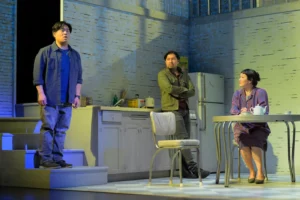
There are so many reasons to get your ticket today to see the West Coast premiere of Christopher Chen’s The Headlands at American Conservatory Theater before the last curtain on March 5:
- For anyone who lives in or near San Francisco, the play is like a SF love fest, featuring some of the most creative and massive projections I have ever seen on stage that place us in the middle of both famous and obscure parts of the City against a turn-table of massive scenic settings, both designed by Alexander V. Nichols.
- Tribute is magnificently paid by Wen-Ling Liao’s lighting design to the great noir and mystery films once made in San Francisco (think, Alfred Hitchcock or John Huston) through the giant shadows, dark corners, and stark lighting contrasts so incredibly employed.
- The sounds of San Francisco are all around us thanks to Leah Gelpe’s sound design, from the screech of unseen trolleys to the sounds of a Bay’s constant waves and winds, furthering engulfing us in the City’s magical, mysterious atmosphere.
- And all of the above create the perfect backdrop for Christopher Chen’s brilliantly conceived and constructed, whodunit mystery where memory plays many tricks among a set of intriguing characters who are all San Franciscans through and through, each expertly played by a cast perfect in every dimension and so deftly directed by ACT’s Artistic Director, Pam MacKinnon.
When an hour, forty minutes with no intermission passes as if only a half hour or so; when as an audience member you find yourself turning into an active, amateur sleuth trying to figure out fact from fiction; and when in the midst of a murder mystery you still find much comic relief – then it is obvious that what you are watching is a must-see production that you must tell all your friends to come see.
The set-up for the evening’s intrigue begins by a young guy strolling out on stage, introducing himself in a jocular, jovial manner to the audience as Henry, “a rare bird [who is] a SF native” and who “work[s] in tech.” He also describes himself rather sheepishly as “an amateur sleuth” who likes to research cold cases of murder mysteries that took place in his hometown of San Francisco. He then begins telling us about a twenty-year-old, unsolved, alleged murder of one George Wong. As a contractor with his own business, Wong was evidently his final day of life in his kitchen at his Sunset District home mid-day, a time he should not have been there. It was later determined that a gun wound had killed him around noon; he was not discovered until four hours later when his wife, a piano teacher, arrived home. Even though there were no witnesses, no found weapon, nothing stolen, nor no signs of forced entry, the murder was ruled to be caused by a burglary gone wrong.
We soon discover George Wong was Henry’s dad; and the now grown Henry has memories of that day, of the days leading up to it, and even of a conversation with his aged mom who recently died that raise questions in his mind as to what really happened to his dad, and why. Henry is on a mission; and he has clearly decided that we are to join him as he delves into and replays before us his memories. He tells us, “They, my memories, might be the missing clues.”
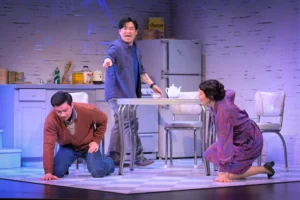
Scenes begin to unfold from years past that occurred days before his father’s death when a little boy walks unexpectantly into a heated conversation between his parents, when he sees his father staring out a second-floor window into seemingly foggy nothingness, or when he hears his father playing the same few unresolved chords on the piano time and again. And things that at the time probably left a kid curious but not much else, now each is what his adult self tells us, “Looking back, I see it as the clue it is.”
With this quick introduction, Christopher Chen proceeds to build into his script more twists and turns than a dozen Lombard Streets, with some leading into dead ends while others reverse the direction to replay a memory time and again, but each time with some new element. The question becomes, is the new element a recaptured memory, a hypothesis to be tested out, or a vivid imagination where the boundary between real and not real completely blurs in the mind of our narrator.
The playwright keeps warning us about the reliability of memory as Henry and other characters say of recalled incidents such things as “At least that is how I imagine it;” “But maybe I am conflating two different things,” or “I extrapolated that last part.” And with each repeated scene and each such admission, we as audience become even more invested in trying to separate fact from fiction and to be an active partner with our narrator in uncovering who committed so many years previous this bloody deed that upended his and his mother’s lives.
While overall wonderfully underplaying the role of Henry in order to make our new friend and fellow sleuth on stage seem less actor and more like recent acquaintance in the neighborhood, Phil Wong as Henry employs numerous techniques that so convincingly display there is much more going on in the tossing and turning thoughts of his mind that his overall, calm, outward appearance shows. A mouth slightly opens and mouths a couple of unsounded words that remain in thought. Eyes stare without seeing anything that we are seeing but that evidently are searching some scene from the past for something heretofore overlooked. A grown Henry invites us into his memories where he once stood as a boy, often seemingly playing both ages at the same time, now looking out that window with his dad to see as an adult what he may – or may not – have seen as a boy twenty years past. And throughout, Phil Wong projects the image of a guy next door in one of the City’s neighborhoods whom we have just met but feel we already have known a long time.
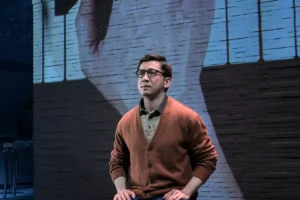
Equally impressive in unique and different ways are the other members of this stellar cast. Erin Mei-Ling Stuart and Johnny M. Wu are Henry’s parents, Leena and George, who in some memory replays are two, young, giddy, but passionate lovers exploring together the City and their unlikely mutual attraction – he being a recent immigrant and dishwasher and she being a shipping magnate’s heiress. Later scenes that play out time and again for Henry with re-thought variations provide both actors with ample opportunities effectively to convey a wide range of emotional reactions and personal characteristics, with each adding touches that enhance the mystery and an ever-increasing number of unanswered questions.
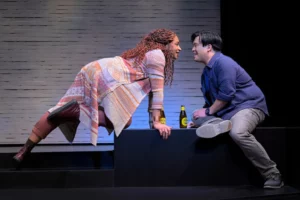
Sam Jackson is the Black girlfriend, Jess, of Chinese-American Henry; but together they are a San Francisco natural pairing. Henry tell us that a terrific date night is their looking at old criminal photos of murdered victims to try and figure out in how many ways a head could have been burgeoned. Jess is on the surface an eager, inquisitive, and intuitive partner in the past crime’s current exploration; but there may be more to Sam Jackson’s multi-layered, well-constructed depiction of Jess that meets our – much less, Henry’s – eyes.
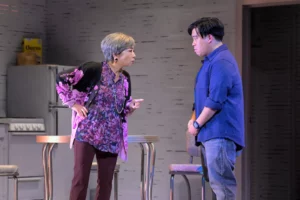
Keiko Shimosato Carreiro absolutely commands the stage each time she appears either as an older Leena bringing to bear her own memories of her relationship with George or as Leena’s best friend, Pat, whom clue-searching Henry seeks to confirm one of his theories. Especially in the latter role, her Pat postures a proud defiance and a smirk of ‘you’re so young and naïve’ as she listens to Henry’s latest possible conclusions of what he thinks happened between his dad and his mom and why.
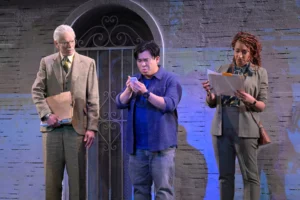
Also playing two very different characters is Charles Shaw Robinson. As George’s once-business partner, Walter, he is reserved and hesitant to engage in Henry’s venture to re-open the case of his father. As the Detective who actually worked on the case two decades prior, he is hilarious as he good-naturedly mocks Henry’s “TaskRabbit” attempt to repair the job he was not able to do himself, poking fun also at himself as “Yep, I was the guy who didn’t get the guy.”
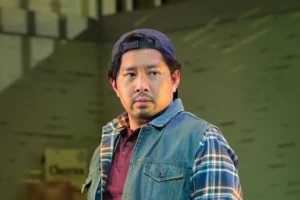
Among a host of strong performances, Jomar Tagatac rounds out this cast with a knock-it-out-of-the-park rendering of Tom, a person who appears deep into the story and whose role must remain unexplained in order to preserve yet one more aspect of a puzzle play where new pieces keep being added. While little can be said now, closely watch the quiver of a cheek, eyes that redden and well up while still tearless, and a foot that twitches ever so slightly to understand the power of portrayal Jomar Tagatac brings to this latecomer, Tom.
While already complimented in the opening lines of this review, volumes more could be written about the partnership of playwright Christopher Chen and director Pam MacKinnon and the scores of decisions made to underscore the San Francisco, noir, mysterious, and psychologically uneasy natures of The Headlands. Especially powerful are their uses of long, silent pauses when so much happens to advance the story during moments when nothing is happening save the expressions on each of the faces we are glued to watching.
And the beauty of it all, my dear reader, you actually know so little of what really happens in this whodunit; but hopefully you are absolutely now convinced that grabbing a seat in ACT’s storied Toni Rembe auditorium is a must-do for this must-see.
Rating: 5 E, MUST-SEE
A Theatre Eddys Best Bet Production
The Highlands continues through March 5, 2023 in a West Coast premiere production by American Conservatory Theater on the Toni Rembe stage, 415 Geary Street, San Francisco. Tickets are available online at https://www.act-sf.org , by phone at 415-749-2228, or by email at tickets@act-sf.org.
Photo Credits: Kevin Berne
